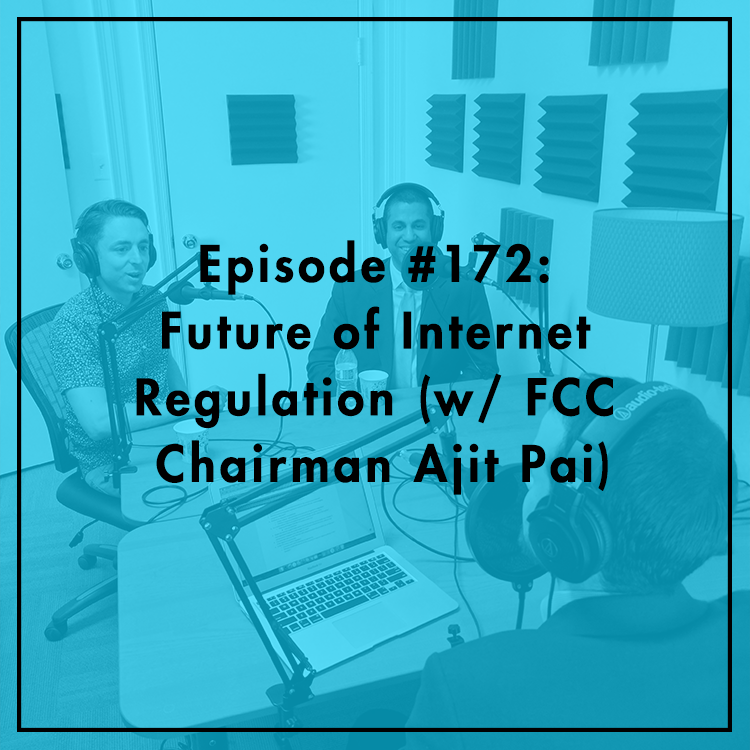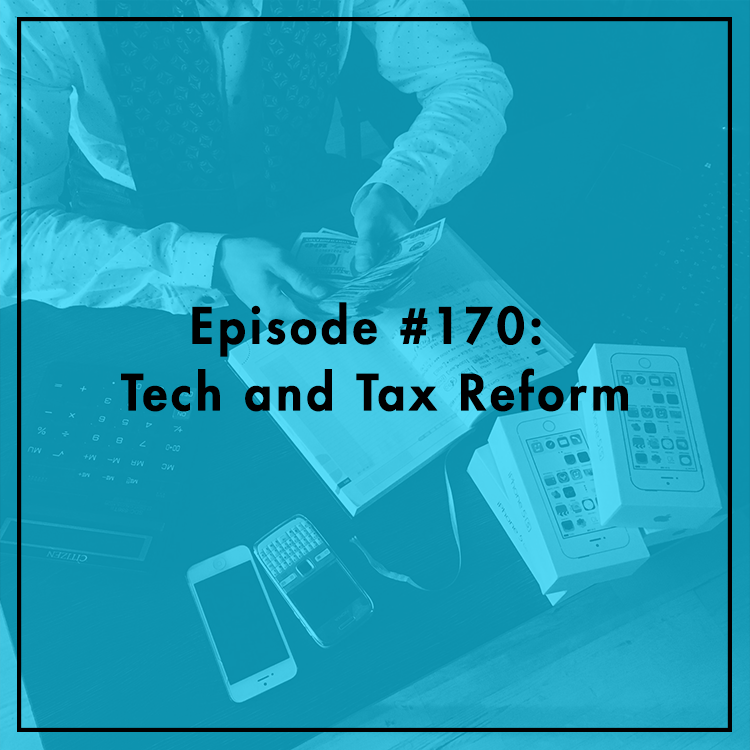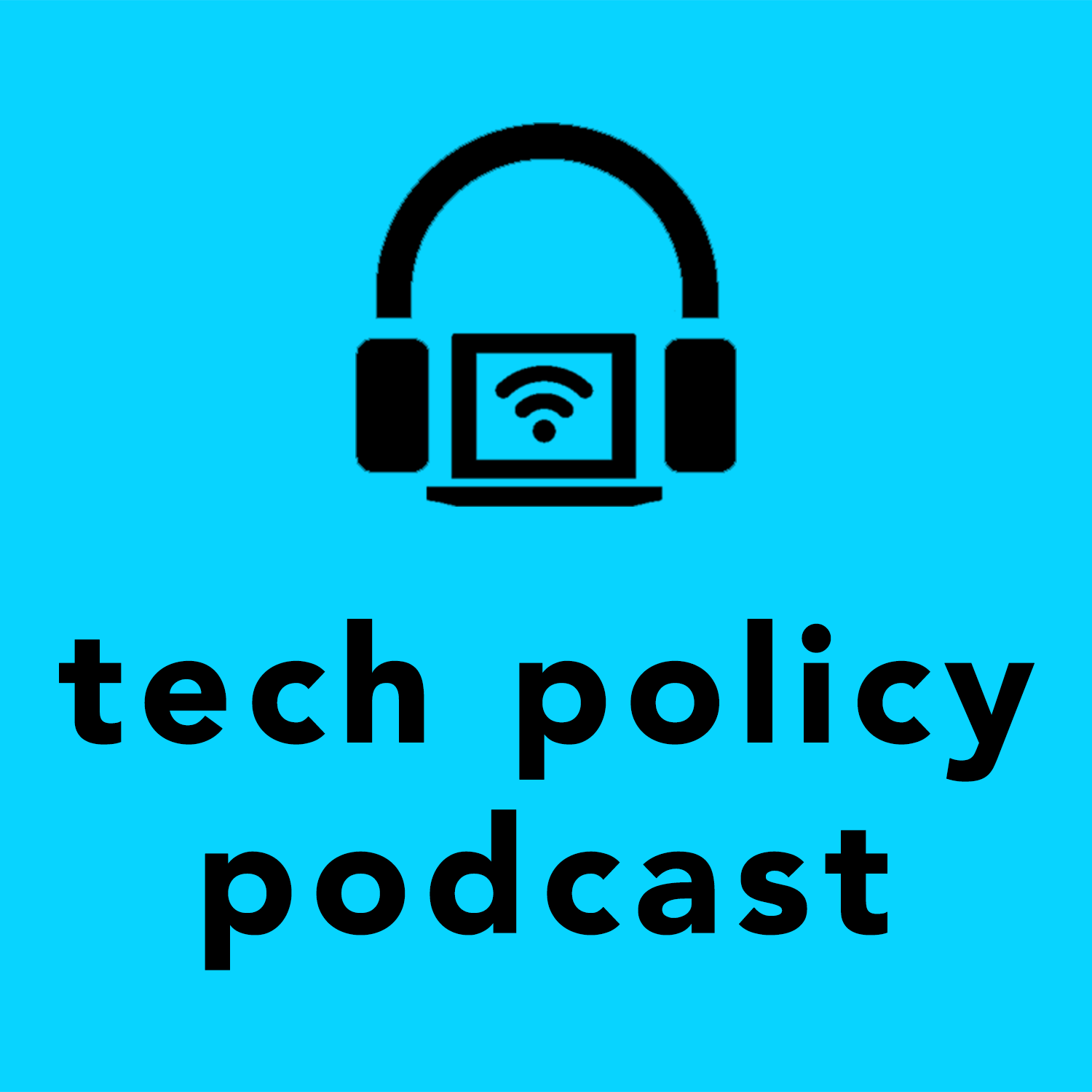Episodes

Friday May 12, 2017
#174: Vaping and the FDA
Friday May 12, 2017
Friday May 12, 2017
How does an e-vapor business navigate the FDA’s approval process? On August 8, 2016, the Food and Drug Administration’s “Deeming Rule” took effect, starting a two-year period where every manufacturer of e-cigarettes, e-liquid, and other vapor products would have to get permission from the FDA to keep their products on the market. You’ve heard some statistics on this podcast trying to quantify the regulatory burden, which could be anywhere from a few hundred thousand to millions of dollars per product. But what does that actually look like in the real world? Chris Howard and Jeff Sanderson from E-Alternative Solutions discuss the impact and what they’re doing to get their Cue product through the FDA’s process.

Thursday May 04, 2017
#173: NSA Checks Itself?
Thursday May 04, 2017
Thursday May 04, 2017
Last week, the National Security Agency (NSA) announced it was ending a surveillance practice known as “about collection.” It’s one piece of a larger puzzle called “Section 702,” the legal authority behind some of the programs first revealed to the public in the Snowden leaks of 2013. While “about collection” is focused on surveillance of foreign communications, Americans’ data are routinely swept up in the process. The data can be queried by the FBI and local law enforcement for domestic purposes, as we discussed in a previous episode. Does the NSA’s announcement indicate that the intelligence agency is cleaning up it's act? Is our government capable of self regulation and oversight? What's the NSA’s motivation here? Evan discusses with friends of the show Neema Guliani, legislative counsel at the American Civil Liberties Union in DC, and Liza Goitein, co-director of the Brennan Center for Justice's Liberty and National Security Program.

Thursday Apr 27, 2017
#172: Future of Internet Regulation (w/ FCC Chairman Ajit Pai)
Thursday Apr 27, 2017
Thursday Apr 27, 2017
Yesterday, at the Newseum in Washington, DC, FCC Chairman Ajit Pai outlined his vision for the future of Internet regulation, including a plan to undo "Title II." In 2015, Pai's predecessor, Tom Wheeler, reclassified broadband Internet as a "common carrier" service under Title II of the 1934 Communications Act. Net neutrality activists say that public utility regulations are necessary to have a free and open Internet. Critics of Title II, including Pai, argue that the rules are outdated and depress investment and innovation. Does the answer lie somewhere in between? What role might Congress and the Supreme Court play? Evan and Berin discuss all that and more with Chairman Pai.

Monday Apr 24, 2017
#171: Tech and Immigration
Monday Apr 24, 2017
Monday Apr 24, 2017
How does immigration impact the tech sector? Recently, President Trump ordered federal agencies to review the H-1B visa program, which is used by many tech companies to fill roles they claim can't be filled by Americans. As a candidate, Trump took tough stances on immigration. Should tech companies be worried? Could the review actually improve the program by rooting out fraud and abuse? What role should Congress play? Evan is joined by Michael Hayes, Senior Manager for government affairs at the Consumer Technology Association.

Wednesday Apr 19, 2017
#170: Tech and Tax Reform
Wednesday Apr 19, 2017
Wednesday Apr 19, 2017
Congress and the White House tried, and failed, to repeal and replace Obamacare. Since then, their focus has shifted to other priorities — in particular, reforming America’s tax code. It’s been decades since Congress did any significant reform, but there’s generally widespread agreement that our tax code is too long, too complicated, and riddled with loopholes. What would a lower corporate tax rate mean for tech companies and consumers? Will the proposed “border adjustment tax” mean a big adjustment for tech? Will there be winners and losers? How would reform impact domestic firms versus multinationals? Evan is joined by James Lucier, Managing Director at Capital Alpha Partners, a Washington-DC based policy research firm.

Friday Apr 14, 2017
#169: The Future of Tech Policy
Friday Apr 14, 2017
Friday Apr 14, 2017
Is tech policy stuck in the past? Does innovation move faster than government’s ability to keep up? Are we fighting over what to do with last year’s products, when we should be planning for what lies ahead? Evan is pleased to welcome to the show Austin Carson, Executive Director at TechFreedom. Previously, he worked in Congress on a variety of tech policy issues, including encryption, cybersecurity, and intellectual property. He discusses lessons learned from his time on the Hill, where the future of tech policy is headed, and how think tanks like TechFreedom can help foster bipartisan dialogue and implement solutions to seemingly intractable problems.

Monday Apr 10, 2017
#168: FBI and Facial Recognition
Monday Apr 10, 2017
Monday Apr 10, 2017
Would you agree to stand in a police line-up if you never committed a crime? Probably not. But if you have a drivers’ license, you might be in a perpetual, digital line-up. 18 states allow the FBI to scan your license photo, and many states allow local law enforcement to do the same. One in two American adults — that’s about 125 million people — are in the FBI’s facial recognition database, and most, if not all, searches are conducted without a warrant.
Evan is joined by Alvaro Bedoya, Executive Director of the Center on Privacy & Technology, Georgetown Law, who testified at a recent hearing in Congress on the FBI’s use of facial recognition technologies (FRTs). They discuss the state of FRTs, how they impact different communities, and how policymakers can balance the needs of law enforcement with civil liberties and due process. For more, check out https://www.perpetuallineup.org/.

Wednesday Mar 29, 2017
#167: The Airbnb Wars Rage On
Wednesday Mar 29, 2017
Wednesday Mar 29, 2017
HomeAway, Airbnb, and other short-term rental platforms are at war with cities across the country. Nashville’s Downtown has the highest hotel rate in the U.S. — even pricier than New York and San Francisco. Despite that, the city council passed a law capping the number of second homes in a neighborhood that can be rented out to tourists. In a lawsuit brought by the Beacon Center, a local think tank, the judge ruled against the city but left the door open for lawmakers to rewrite the bill. Will litigation drag on, or will the Tennessee state government step in and nullify city laws? Elsewhere, in Colorado, a patchwork of regulations illustrates the different approaches that cities are taking. Jared Meyer, Senior Research Fellow at the Foundation for Government Accountability, joins. For more, see his op-ed.

Friday Mar 24, 2017
#166: Hacking the CIA
Friday Mar 24, 2017
Friday Mar 24, 2017
Earlier this month, Wikileaks published 9,000 pages of hacked CIA files. The haul, dubbed “Vault 7,” catalogues some of the spy agency’s hacking techniques, including exploits of Android and iOS phones, and even Samsung Smart TVs. When the feds discover vulnerabilities in the products we use, should they tell the companies so they can patch things up? Or does the government sometimes need to keep these things secret for national security purposes? What are the trade-offs? Evan is joined by Heather West, Senior Policy Manager for the Americas at Mozilla and Mieke Eoyang, Vice President of the National Security Program at Third Way. They discuss what Vault 7 means for encryption, the Apple v. FBI case, and the government’s “Vulnerabilities Equities Process” (VEP).
For more, see Mozilla’s primer on VEP and its statement on Vault 7.

Tuesday Mar 21, 2017
#165: Regulating the Universe
Tuesday Mar 21, 2017
Tuesday Mar 21, 2017
Who's in charge of the universe? "Innovative space activities" like asteroid mining and private missions to Mars raise key questions for countries and their regulators. Can you "plant a flag" on an asteroid? How can countries cooperate in space without interfering with each other? Is the "weaponization of space" a growing concern between the US, Russia, and China? Congress is trying to figure out the answers. Evan and Berin discuss a recent hearing with Jim Dunstan, longtime space lawyer and founder of the Mobius Legal Group.

